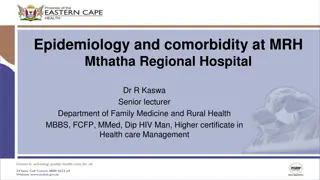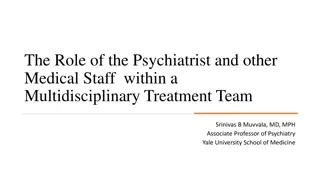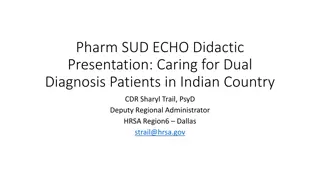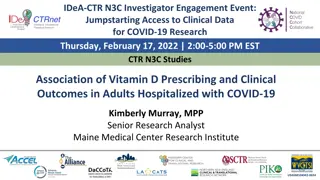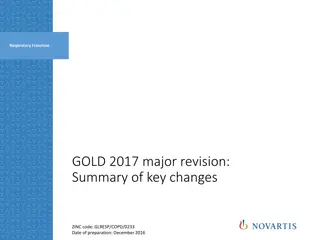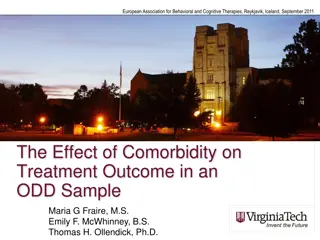Cardiovascular Disease in HIV
The increased risk of cardiovascular disease in people with HIV and specific strategies to treat it. This presentation discusses potential mechanisms, comorbidity gaps, and the impact of traditional risk factors. Explore the role of inflammation and immune dysfunction in atherosclerosis and vulnerab
0 views • 38 slides
Insights from the REPRIEVE Trial for Managing Cardiovascular Risk in Patients with HIV
Cardiovascular disease is a growing concern in individuals living with HIV, despite advancements in treatment. The REPRIEVE Trial sheds light on the importance of assessing cardiovascular risk and implementing primary prevention measures in this population. Dr. Grinspoon's financial disclosures and
0 views • 35 slides
The REPRIEVE Trial: Developing Cardiovascular Disease Prevention Strategy for People Living with HIV
The REPRIEVE trial focuses on developing a cardiovascular disease prevention strategy for individuals living with HIV. It addresses the increased risk of CVD in this population, even with good viral suppression. The study evaluates the use of pitavastatin, a statin with anti-inflammatory properties,
1 views • 33 slides
Recent Developments on the Geroprotective Potential of Metformin in Human Studies
Recent human studies highlight the geroprotective potential of metformin in various conditions such as type II diabetes and cancer. Metformin has shown benefits in reducing all-cause mortality, macrovascular effects, and increased survival rates. However, concerns about study design and replication
0 views • 16 slides
Epidemiology and Comorbidity at MRH Mthatha Regional Hospital by Dr. R. Kaswa
This presentation by Dr. R. Kaswa from the Department of Family Medicine and Rural Health at MRH Mthatha Regional Hospital covers the epidemiology, screening, testing, recoveries, mortality, and lessons learned from the COVID-19 pandemic. It provides statistics on COVID-19 cases, testing positivity
0 views • 24 slides
The Role of Psychiatrists in Co-occurring Disorders Treatment
Psychiatrists play a crucial role in treating co-occurring substance use disorders alongside other medical staff in a multidisciplinary team. Integrating mental health and addiction treatment is essential, as only a small percentage of individuals with addiction receive care. Factors promoting optim
0 views • 23 slides
Impact of Severe Mental Illness, Physical Comorbidity, and COVID-19 in South Asia
The research funded by the National Institute for Health Research aims to address the mortality gap and health inequalities faced by individuals with severe mental illnesses in South Asia. The study focuses on improving outcomes for mental and physical multimorbidity, reducing depression and anxiety
0 views • 9 slides
Human Disease Symptom Network: Understanding Disease Relationships Through Symptoms and Genes
The Human Disease Symptom Network (HSDN) is constructed using a large-scale medical bibliographic records database to form a network of human diseases based on symptom similarities. By integrating disease-gene associations and protein-protein interaction data, correlations between symptom similarity
0 views • 37 slides
Understanding Dual Diagnosis: Link Between Substance Use Disorders and Mental Illness
Dual diagnosis, also known as co-occurring disorders, refers to the simultaneous presence of substance use disorders and mental illness in individuals. This presentation delves into the definitions, treatment options, and ways to support communities to prevent overdose. Factors contributing to the c
0 views • 15 slides
Association of Vitamin D Prescribing with Clinical Outcomes in COVID-19 Hospitalized Adults
Investigating the impact of Vitamin D prescribing on clinical outcomes in adults hospitalized with COVID-19, this study analyzes the association between Vitamin D treatment and patient outcomes such as mortality, length of stay, and need for ventilation. The research explores the complex effects of
0 views • 8 slides
GOLD 2017 Major Revisions in COPD Management
GOLD 2017 introduces significant changes in Chronic Obstructive Pulmonary Disease (COPD) management, focusing on areas like defining COPD, assessment tools, pharmacological management, inhaler techniques, and comorbidity management. The updated definition emphasizes persistent respiratory symptoms.
0 views • 17 slides
Effect of Comorbidity on Treatment Outcome in Oppositional Defiant Disorder (ODD) Sample
Study presented at the European Association for Behavioral and Cognitive Therapies in Reykjavik, Iceland, focused on the impact of comorbidity on treatment outcomes in children with ODD. The research highlighted the prevalence of ODD and anxiety, their distinguishing characteristics, and the potenti
0 views • 22 slides




